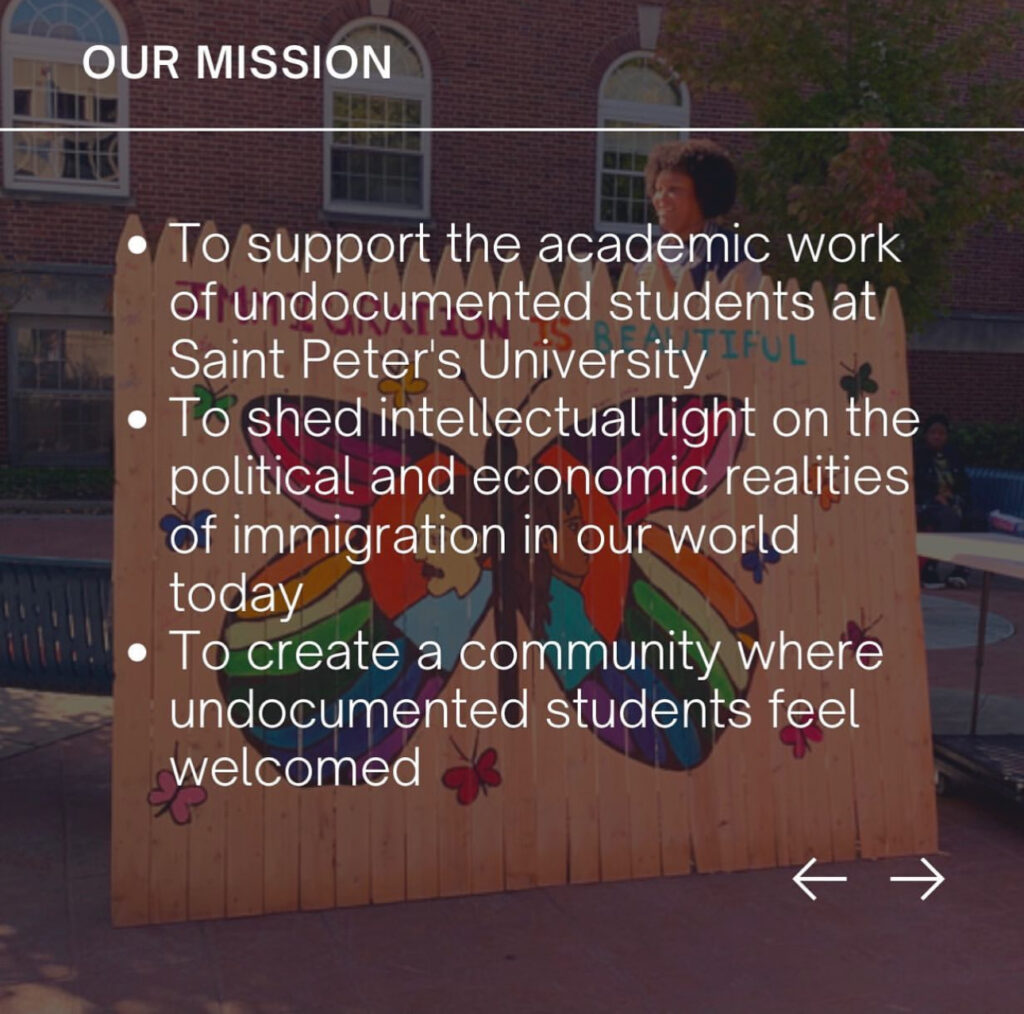Photo via @spu_tcus / Instagram.
On Tuesday, Nov. 5, 2024, over 40 million people throughout the country nervously tuned into election night as ballots were being counted and results were being updated. Many voters watched in shock as blue states became red and red states became blue—wondering what Donald Trump’s second presidency will mean for undocumented citizens.
Israel Cedeno, an Ecuadorian-American student from Saint Peter’s University, was one of the voters from this past election. He spoke with Slice of Culture on what he thought the next four years would look like for Latino communities following the news of Trump’s re-election. His answer brought way to another question that some Americans were wondering post election: How did Donald Trump garner the support of 45% of Latinos?
“Because we have a president that is driven by so much hate, that hate can overpass a multitude of barriers and ultimately result in consequences for everyone. A person with a hateful agenda can do anything,” Cedeno told Slice of Culture.
Trump’s Deportation Plan
During the Republican National Convention in July of this year, Trump said to his supportive crowd that “The Republican platform promises to launch the largest deportation operation in the history of our country, even larger than that of President Dwight D. Eisenhower.” According to CBS News, in Trump’s Deportation Plan, Trump refers to President Eisenhower’s 1954 mass deportation known as “Operation Wetback.”
“Operation Wetback” was a program created by Joseph Swing, the head of the United States Immigration and Naturalization Service (INS) at the time. Its purpose was to deport undocumented Mexican immigrants back to their homeland. However, although the number has not been confirmed, many American born citizens also got swept up in the process.
According to NBC News, the term “wetback” is a racial slur that was in “reference to Mexican migrants who wouldswim across the Rio Grande from Mexico into Texas.”
The operation resulted in a total of 1.3 million people being deported with the use of military tactics. Though many of those Mexicans had entered the country legally by applying for immigration programs, government officials used racial stereotypes to pinpoint people that they would be sending “back.”
Despite Trump’s promise to have results greater than those of Operation Wetback, he still secured more votes from the Latin and Hispanic communities during the 2024 election than he did when running for his first term. NBC News reported that he accumulated 32% of Latino votes in 2020, but that number has since increased by 13 percentage points.

According to the U.S Census Bureau, in 2020, Hudson County had a Hispanic/Latino population of at least 293,019 people. By 2022, this number increased as the population rose to 298,081, Hudson County Population.
At Saint Peter’s University, located in the heart of McGinley Square in Jersey City, 40% of undergraduate students are Hispanic as of 2023. Some students spoke with Slice of Culture on their insights on the Democratic Party and how their policies influenced their decisions.
The Perspective of a Latino Voter
Omaria Serrano, a Puerto Rican-American student at Saint Peter’s University, believes that the Democratic party was not accepting of her religious beliefs.
“In one of her rallies, someone was protesting and said ‘Jesus is Lord’ and she said ‘You guys are at the wrong rally,’” Serrano explained. “You just lost my vote because you are not welcoming to all people. This country was a Christian country at first, so for her to neglect God was a little rude in my opinion.”
Serrano was referring to Vice President Kamala Harris’ rally in La Crosse, Wisconsin just weeks before election night. Harris’ response, “You guys are at the wrong rally,” has sparked controversy across the nation, with many wondering whether or not she supports Christians.
Hearing this statement influenced Serrano to research more about the Republican party, hoping to find values that modeled her own.
“If someone told me to vote for a president based on their personality, I would not vote for Trump. He is too rough,” Serrano said. “But with Trump, we have already seen the way he runs his office. I think it is a little too excessive but I also see the reason behind it.”
Serrano’s newfound interest in the Republican party however came as a shock to those around her.

But Serrano says that it is important to not vote based on emotion, believing that most of her peers voted a certain way due to their own outrage. She claims that although Trump’s deportation policies are harsh, they are needed in order to protect American citizens.
However, students like Cedeno believe that there is a fine line between “protecting and committing unlawful acts.”
What Do Other Latin-Americans Think?
After being introduced to the Center of the Undocumented Students (TCUS) his freshman year, Cedeno decided to join the team as a work-study student, hoping to make a difference in the community. TCUS works to find legal support for students that are undocumented, DACA students, and those whose family also need citizenship.

Cedeno believes that Trump will face difficulty enforcing his strict deportation plan, especially on “Day 1,” which the former president said at a Madison Square Garden Rally, a few days before the election.
“A lot of the things that Trump wants would not work here because it is more difficult to do so. It is illegal to ask who is documented or not,” Cedeno explained.
Since March 2019, as stated by the Federation for American Immigration Reform (FAIR), New Jersey has been a sanctuary for illegal immigrants. This means that there are heavy restrictions on the federal immigration authorities’ ability to detain people based on their status.
With this understanding, Cedeno hopes that Trump will not be able to achieve his deportation goals, or at least not at the rate that he claims in order to give immigrants time to find resources.
Although Cedeno shares passionate sentiments to stopping this process from occurring, he understands why some Latinos and Hispanics might have voted red.
“Latinos tend to be more Conservative,” said Cedeno. “Another thing that happened is a flood of new immigrants, mostly Latinos, came in, so all of those immigrants that have been here for years without [documents] and are waiting in the line for a pathway for citizenship or a green card, many of them are frustrated. So they are taking it out on the newer immigrants for not receiving the resources that they have been waiting for.”
Even though Hudson County is a primarily Democratic area with Harris securing 66% of the votes, many people believe that the blue party did not cater to the needs of citizens.
Patricia Campos-Medina, the president of the Latina Civic Action, said that Democrats have “gotten used to winning with the same folks (they) always win. They’re not engaging new voters and younger voters, so they’re disfranchised from the local party.”
Without you, there is no Slice of Culture. Any type of donations helps continue our mission of supporting aspiring journalists and keeping local journalism alive. Make a donation today or become a member with extra perks.
The Path To Citizenship
Valentina Amador, a Colombian under asylum, has been navigating the legal immigration process since 2021. Contrary to Cedeno’s perspective, Amador finds that Trump’s promises surrounding deportation are exactly what this country needs, claiming that that is the reason why 45% of Latinos casted their votes on him.
According to exit polls from Edison Research, 2024 Presidential Election Exit Poll, 39% of voters believe that illegal immigrants should be deported whereas 56% think that they should be given the chance to apply for legality, like Amador and her family did.

Although the process to become an official U.S citizen is rather complicated and quite lengthy, sometimes taking years, Amador expressed that there is no reason as to why one should enter the country without at least trying to get their papers. And whoever does will be the immigrants that Trump is attempting to remove.
“Those that are doing things illegally, those that cross the border several times, those that came into the country and have no desire to do things right, that do not pay taxes, that do not work, that do not do anything for the country… I feel like those are the ones that are gonna feel the consequences,” Amador said.
“But those who came, let’s say like me, that have been trying to do everything right, pay taxes, that are legally here, that are trying to, you know, actually invest into the country. I feel like those are the immigrants that Donald Trump is not referring to.”
Amador is one of many immigrants that feel this way. As New Jersey and other states become less Democratic, more Latinos and Hispanics are weighing in on this conversation.
With Trump making his way to the presidential office in less than two months, America is still divided on whether or not to accept his unique policies.
“I have always looked at this from a positive standpoint. Trump promised all these enforcements during his first [term]. If we survived that one, we will survive this one too,” Cedeno expressed.
Some are echoing opinions similar to that of Amador and Serrano, while others are contrasting these views and have adopted Cedeno’s mindset. If so many individuals are voicing conflicting ideas, how does the country come to the point of agreement and move forward as a unit?



 Get your slice of culture from NJ
Get your slice of culture from NJ Hudson County born & raised
Hudson County born & raised The Locals + The Culture
The Locals + The Culture “Best Grassroots Journalism” @njspj + @njcivicinfo grantee
“Best Grassroots Journalism” @njspj + @njcivicinfo grantee

 Her
Her







 We stopped by Excel
We stopped by Excel










 E
E












